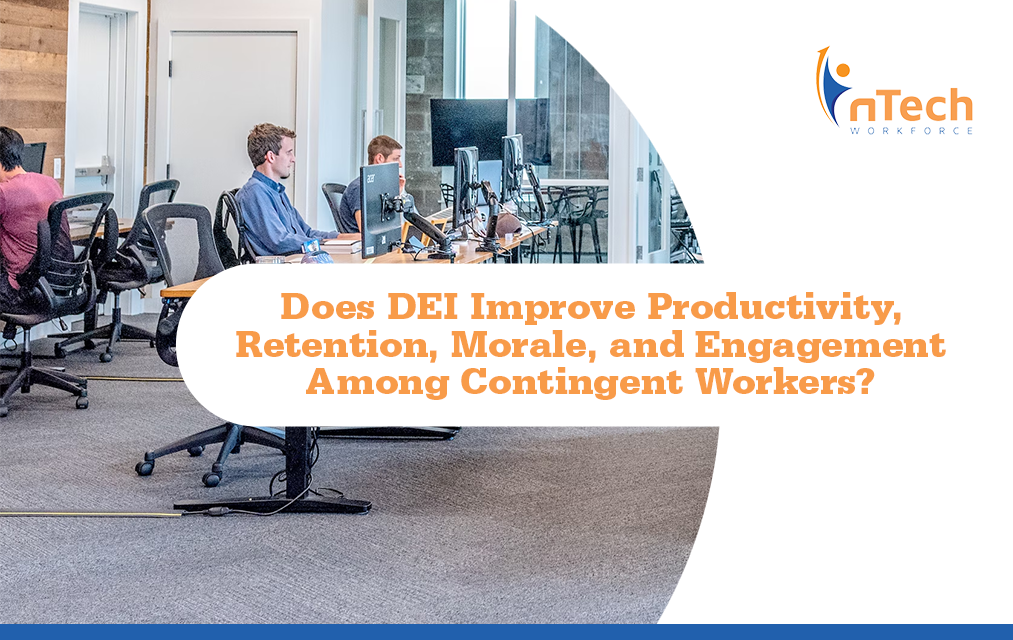Is Contract-To-Hire a Good Idea?
Now is a great time to be looking for a job, but sometimes it can be hard to get your foot in the door, especially for entry-level positions.
3 min read
![]() nTech Workforce
:
Aug 23, 2022 1:36:53 PM
nTech Workforce
:
Aug 23, 2022 1:36:53 PM

Staffing Industry Analysts (SIA) define Contingent Work as: "Work arrangements that differ from regular/permanent, direct wage and salary employment. Contingent work and workers are primarily distinguished by having an explicitly defined or limited tenure…”
Contingent workers are people whom a company engages for a fixed period. Such workers can have either long-term or short-term contracts. A contingent worker can be an independent consultant, freelancer, contractor, part-timer, or someone who’s in an alternative working arrangement.
With almost 47 million workers in the US quitting their jobs, the “Great Resignation” has become a reality exacerbated by the global pandemic. However, it’s not only the pandemic that caused it. Workers (primarily millennials) are searching for more freedom, autonomy, flexibility, and work-life balance. Contingent and remote work is a pathway toward that goal.
The State of Contingent Workforce Management report from Ardent Partners demonstrates that 62% of businesses consider contingent workers an essential component of their workforce. An Intuit report indicates that most US corporations are planning to increase the number of contingent workers in the company, making them over 40% of the total workforce. Given the precocity and uncertainty of our times, more and more organizations are shifting to hybrid and remote work with several contingent workers. It’s estimated that contingent workers will represent 50% of the US workforce by 2050.
The significant difference between a contingent worker and an employee is the roles they’re assigned to. An employee handles day-to-day business operations while a contingent worker is hired for a specific time to perform a specialized task.
Arthur Ransier, Business Strategy Director at nTech Workforce, explains, “Contingent workers engaged through a staffing agency or other intermediary are governed by a work order or job assignment and co-employed by the staffing agency and an end client.”
Employees are mostly engaged in full-time work governed by an employment contract which provides a company with a higher level of control over the employee’s work.
“There are myriad benefits to hiring contingent workers which depend on the channel/service – staffing agencies, crowdsourcing/open innovation platforms, freelancer marketplaces, business process outsourcing partners, gig marketplaces, etc. – but the underlying benefit to unlocking all sources is accessing the best workers, ” says Ransier. Some of the benefits of hiring contingent workers include:
Contingent labor offers numerous benefits to the company and the worker; however, it’s not as simple as it seems. Due to varying labor laws, lack of a proper arrangement between companies and contingent workers, mismanagement, and payroll issues, hiring contingent workers remains challenging for businesses. However, as discussed above, companies must hire contingent workers to meet the demands of increasingly specialized, competitive, and dynamic markets.
To help businesses achieve these goals, nTech provides innovative and customized staffing solutions that cater to your business needs. Our solutions are optimized for facilitating employee growth and solving workplace productivity, diversity, and hiring challenges. Our services include direct hire, staff augmentation, LEVEL-UP, direct sourcing, payroll outsourcing, and agency of record (AOR). We’re committed to finding the most desirable people and building a framework that engages contingent workers.

Now is a great time to be looking for a job, but sometimes it can be hard to get your foot in the door, especially for entry-level positions.

Traditionally, contingent workers have been seen as performing non-core business functions. However, this is far from the realities of the modern...

The demand for contingent workers is expanding rapidly. Areport from Intuit noted that 80% of US corporations with contingent workers are expected to...